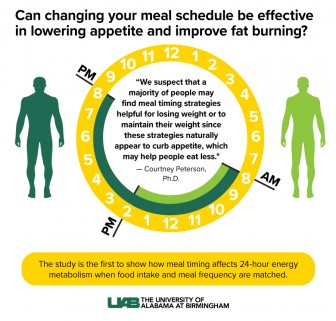UAB Study Shows Limiting Meal Times Can Lower Appetite
Researchers have known for a while that eating earlier in the day when metabolism rates are higher can help with weight loss. So can consuming all meals within a narrow window of time and then fasting for several hours.
“But there was a big question, like why does it help with weight loss?” Courtney Peterson, assistant professor in UAB’s Department of Nutrition Sciences, says. “Is it because it helps people burn more calories, or is it because it makes them less hungry, or both?”
To try to answer that question, Peterson and fellow researchers conducted a study to measure changes in appetite levels and the number of calories people burn when they use Early Time-Restricted Feeding (eTRF), a form of intermittent fasting.
Participants tried two different meal schedules. They spent four days eating from 8 a.m. to 8 p.m., the average schedule for an American adult, and they spent another four days eating the same meals between 8 a.m. and 2 p.m, a version of eTRF.
On the fourth day of each meal schedule, participants remained in a controlled environment for 24 hours so researchers could measure data including levels of the hunger hormone Ghrelin.

Peterson says the results were a bit surprising. They found that the eTRF schedule did not help participants burn more calories, but it did help them burn more fat and it lowered their appetite levels.
“That’s still a major victory,” Peterson says, “because if you can make people naturally less hungry, then that’s going to help them not only with weight loss, but with maintaining their weight.”
Researchers enrolled 11 overweight men and women, a small but appropriate sample size, according to Peterson. The study was published online Wednesday in the journal Obesity.
Peterson says the next step is to test whether people are able to consistently follow the restricted meal schedule and whether it can actually help people lose weight.
Photo by Pixabay
Editor’s Note: WBHM is a member-supported service of UAB, but our newsroom and business operations are separate.
China’s trade surplus surges 20% to a record $1.2 trillion, even with Trump’s tariffs
China's trade surplus surged to a record of almost $1.2 trillion in 2025, the government said Wednesday, as exports to other countries made up for slowing shipments to the U.S. under President Donald Trump's onslaught of higher tariffs.
Vance to meet Danish and Greenlandic officials in Washington on Wednesday
U.S. Vice President JD Vance will meet Denmark's foreign minister and his Greenlandic counterpart in Washington on Wednesday to discuss the Arctic island, at the center of a geopolitical storm.
Claudette Colvin, who refused to move seats on a bus at start of civil rights movement, dies
Civil rights pioneer Claudette Colvin has died. She was 86. Her 1955 arrest for refusing to give up her seat on a segregated Montgomery bus helped spark the modern civil rights movement.
Claudette Colvin, who refused to move seats on a bus at start of civil rights movement, dies at 86
Colvin, at age 15, was arrested nine months before Rosa Parks gained international fame for also refusing to give up her seat on a segregated bus.
Republicans say Clintons risk contempt of Congress for not testifying on Epstein
House Republicans are seeking testimony as part of their investigation into convicted sex offender Jeffrey Epstein. The Clintons say they've already provided in writing what little they know.
FTC accuses AI search engine of ‘rampant consumer deception’
Federal officials say a company that operates hundreds of landing pages for AI answers is running an operation that has duped thousands of users, who were unable to stop costly monthly charges.






